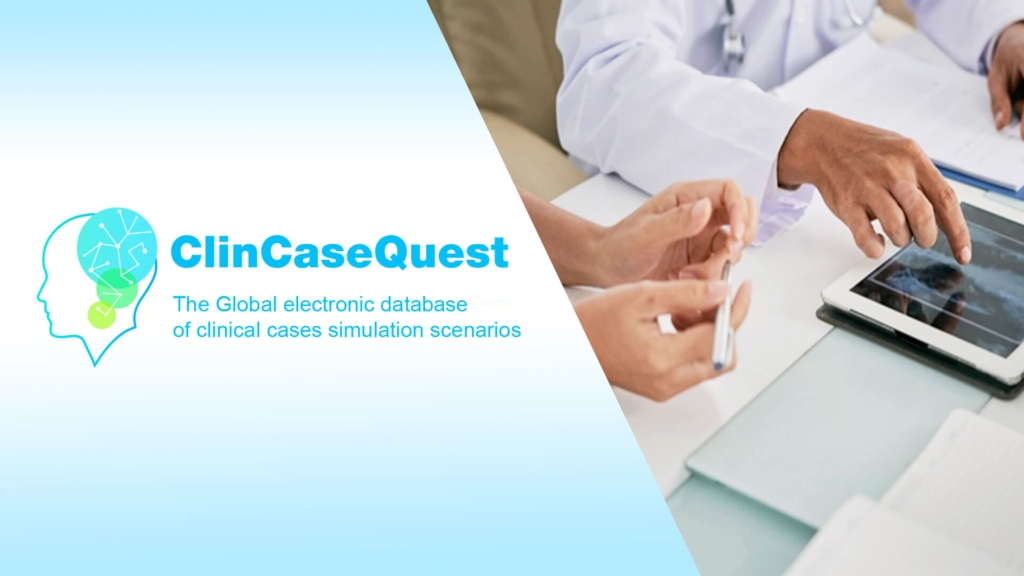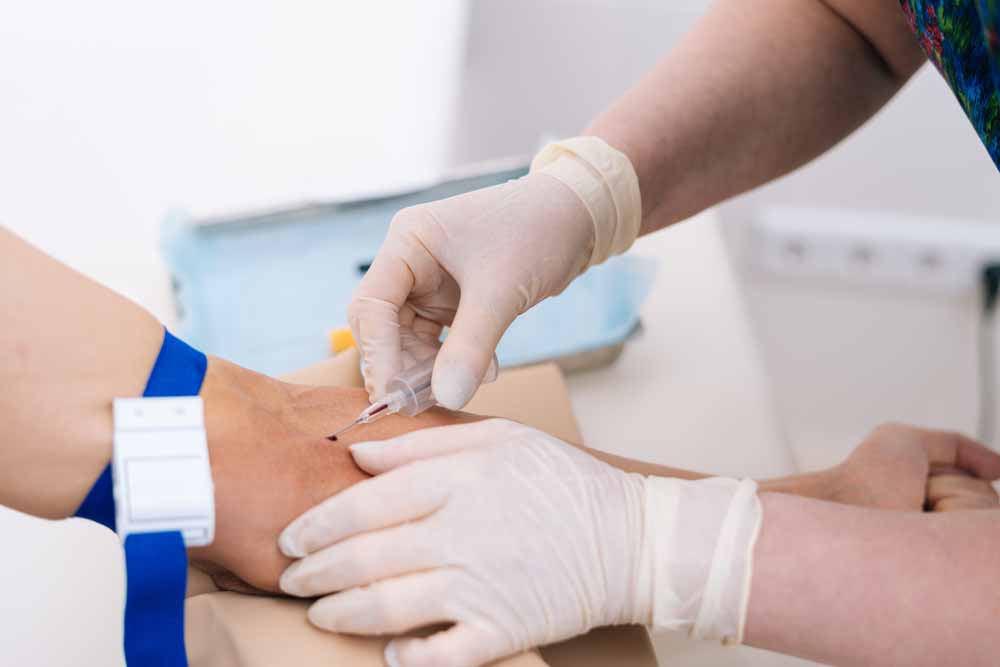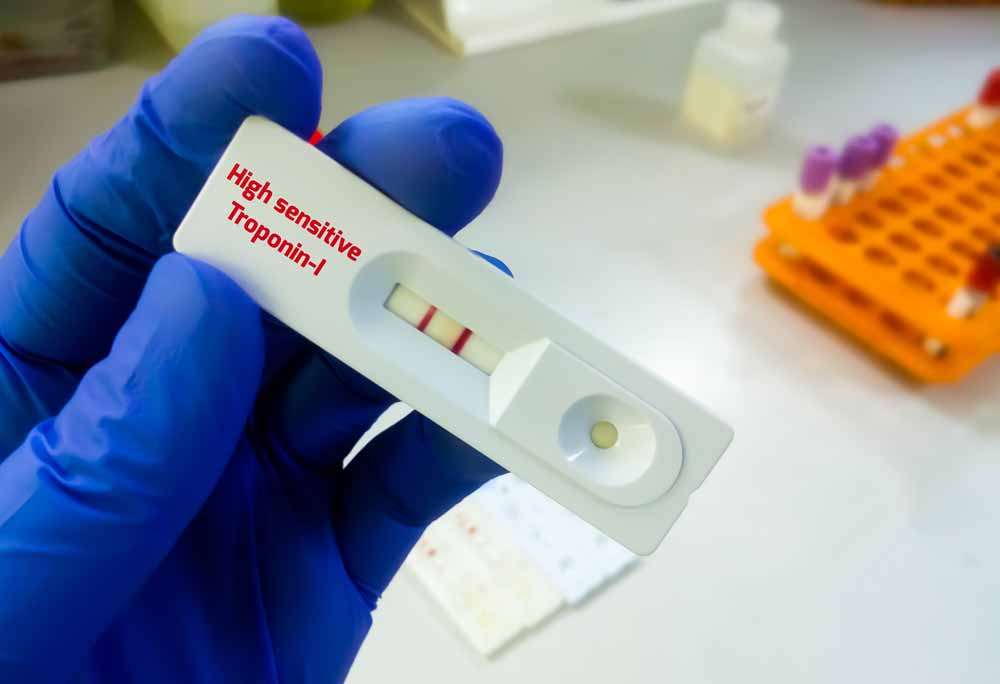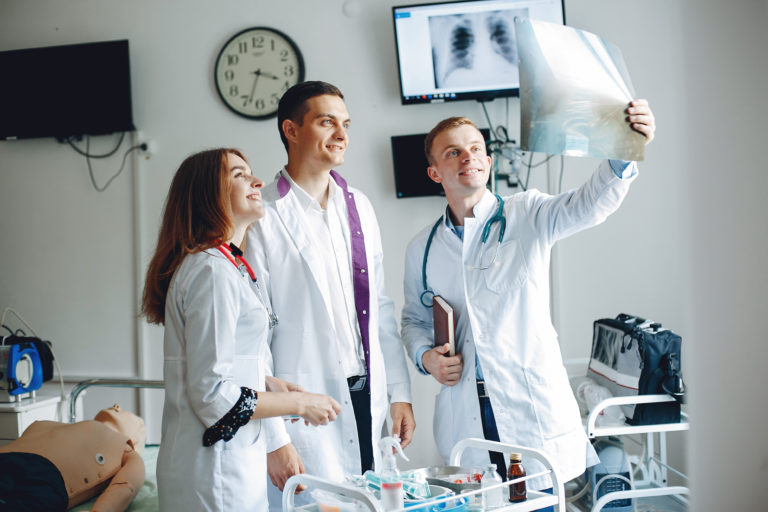Simulation training platform for medical education «The Global electronic database of clinical case scenarios “ClinCaseQuest””

Simulation training platform “Global electronic database of clinical case scenarios “ClinCaseQuest”” was developed to provide medical students, paramedics, interns, clinical residents and doctor’s ability to acquire clinical experience in safe virtual environment for patients via education in virtual rooms of clinical cases. This Project will provide increasing quality of medical education for both undergraduate and postgraduate stages, which will lead to decreasing of worldwide quantity of medical errors and increasing of level of healthcare to population of different countries.
The dynamic development of medical knowledge, the constant updating of clinical guidelines, evidence-based medicine data require the constant development of the modern medical education system, this requires the introduction of new teaching methods. The introduction of interactive teaching methods in medical education using information and educational web technologies can reduce the gap between theoretical and practical knowledge and skills.
The prerequisites for the need to introduce interactive scenarios of clinical cases into the educational process as a method of simulation training are:
- the periodic absence of thematic patients for demonstration to students and the associated impossibility of practical illustration of the whole variety of clinical situations;
- the need to significantly strengthen the practical aspect of training future doctors, as well as high-quality postgraduate training while maintaining an appropriate level of theoretical knowledge;
- the need to optimize traditional means, methods and forms of education;
- the need for high-quality visualization of additional examination methods;
- the need to improve knowledge control methods, the use of computer testing and active learning strategies;
- the need to introduce into the educational process new information and educational web-based learning technologies that increase the effectiveness of teaching and learning.
The Project «The Global electronic database of clinical case scenarios “ClinCaseQuest”” is designed to provide medical students, paramedics, interns, clinical residents and doctors with the opportunity to gain clinical experience in a patient-safe virtual environment through training in virtual clinical case simulators. This project will improve the quality of medical education, both undergraduate and postgraduate. This will help reduce the global number of medical errors and will contribute to improving the provision of medical care to the population of different countries of the world.
Many modern studies have shown that even in highly developed countries, a significant proportion of complications and deaths are associated with preventable medical errors. In Europe, every tenth patient is a victim of a medical error. According to the American Institute of Medicine, about 400,000 deaths worldwide each year are due to avoidable medical errors. Given the high prevalence of medical errors, the problem of their prevention in the provision of medical care to patients has become of great importance, which necessitates the introduction of simulation training, virtual technologies that provide for the simulation of various realistic scenarios of clinical cases. Training in simulation scenarios of clinical cases even during the period of medical education, provides students / interns with the opportunity to independently make decisions, develop clinical thinking, thinking based on the principles of evidence-based medicine, and perform the necessary actions in conditions close to real ones. It also allows them improve the mastery of the necessary skills and their assimilation. Reproduction (simulation) of clinical scenarios contributes to the formation of professional skills with objectification of the achieved level of skill, thus, the readiness of specialists to perform their professional duties in a safe environment for patients.
Some scenarios of clinical cases begin with the work of a paramedic team at the scene of the case, the provision of emergency care, and also demonstrate the peculiarities of transporting a patient in a given situation to a hospital.
This project opens up great opportunities for medical students to gain clinical experience in a safe environment regardless of the working hours of clinics, educational institutions or simulation centers. Our project provides an opportunity to reduce the barrier between theoretical knowledge and practice. All scenarios are reviewed by medical practitioners and comply with international standards for medical care. Students may be interested in standardized clinical cases, simulators of practical skills, and simulation of clinical situations. For in-depth study, our database also contains rare and difficult clinical situations.
Doctor-interns get the opportunity to deepen their knowledge, develop clinical thinking regardless of the work of the clinic and expand their medical horizons with a variety of clinical situations. You will receive detailed explanations and support from the doctors of the virtual clinic, which will help you avoid mistakes in your clinical practice, gaining experience in the virtual environment of professional doctors. Interns may be interested not only in standardized clinical cases, simulators of practical skills, simulation of clinical situations, but also in rare and difficult clinical situations.
Practicing doctors can also improve their skills in the e-case database as part of continuing medical education, with an emphasis on rare and difficult clinical situations.
The creation of interactive simulators of clinical cases is a new teaching method in the field of medical education, based on the combination of theoretical data on a particular medical issue with a clinical case, the results of a patient examination, which provides for the choice of treatment tactics and examination in a virtual environment.
Computer simulation training is an integral part of simulation training. The introduction of virtual patient models in medical education, computer simulation scenarios of clinical cases contribute to an increase in the effectiveness of problem-oriented, case-based teaching methods, with the help of which the barrier between practical and theoretical knowledge is reduced, and logical thinking based on the principles of evidence-based medicine develops.
Visualization of educational information using computer technologies allows solving a number of pedagogical tasks, such as ensuring the intensification of learning, enhancing educational and cognitive activities, the formation and development of critical and visual thinking, visual perception, figurative representation of knowledge and educational actions, knowledge transfer and pattern recognition. Within the framework of medical education, the introduction of visual methods for displaying information, significantly improves the quality of training of specialists, contributes to a deeper memorization of material, the development of professional competence and most completely meets the needs of modern medical education and the need for a doctor to continuously improve his professional competence.
The Global electronic database of clinical case scenarios “ClinCaseQuest” provides the following benefits for continuing medical education:
- gaining medical experience in a virtual environment;
- full immersion in the clinical situation using simulators of clinical cases and on the simulation of clinical situations;
- the possibility of training in rare clinical cases and difficult clinical situations;
- gaining experience without sacrificing the patient virtually;
- gamification of learning;
- increasing motivation to learn;
- high quality visualization of additional examination methods;
- receiving instant comments from the teacher;
- passing the scenario with branching;
- involvement in training of all channels of information perception – tactile, sound, visual, which will ensure the maximum degree of memorization of the material;
- using emotions in learning;
- development of clinical thinking;
- development of thinking based on the principles of evidence-based medicine;
- reduction of fear and stress of independent medical practice among future doctors;
- practicing skills before mastering, re-passing difficult branches of the script;
- deep memorization of theoretical material;
- obtaining cognitive skills in making a diagnosis, conducting differential diagnostics, regardless of the operating mode of the clinic or medical school;
- mastering the methods of diagnosis and treatment in a given situation;
- working out communication skills with the help of dialogue simulators with patients and/or their relatives, with colleagues;
- an objective assessment of the knowledge gained, obtaining detailed explanations and comments from the teacher;
- the ability to apply theoretical knowledge in real clinical practice.
Principles of the project “The Global electronic database of clinical case scenarios “ClinCaseQuest””
- Visualization. Most clinical case scenarios contain high-quality visualization of additional research methods
- Branching. Most clinical case scenarios have a non-linear flow and a branched structure. To build training scripts, Branching techniques are used, as well as micro Branching.
- Gamification. The student feels like a participant in the scenario and, together with the main characters, solves clinical and diagnostic problems, chooses the tactics of treatment.
- Evidence-based medicine. All clinical case scenarios are based on current international clinical guidelines and evidence-based medicine data.
Features of constructing scenarios for clinical cases:
- clinical case scenarios are predominantly educational in nature, due to which a deep study of theoretical and practical material is realized;
- errors do not accumulate and are not transferred to the debriefing, since in the scenarios of clinical cases, a step-by-step study and work on errors is carried out in order to develop standards for the provision of medical care;
- case scenarios are constructed using branching and multiple sequential microbranching methodologies.
Subdivisions of the virtual clinic of the project “The Global electronic database of clinical case scenarios “ClinCaseQuest””
- Outpatient reception of an electronic database of clinical cases. Doctors of the electronic database of clinical cases “ClinCaseQuest” carry out outpatient reception of patients. Outpatient diagnostics of various diseases that do not require inpatient treatment are carried out. The clinic’s doctors provide highly qualified advice to virtual patients.
- Hospital of the electronic database of clinical cases. The electronic clinic of the Global electronic database of clinical case scenarios “ClinCaseQuest”” includes departments of various specializations that provide assistance to virtual patients in a hospital setting.
- Intensive care unit. The electronic clinic of the Global electronic database of clinical case scenarios “ClinCaseQuest”” includes an intensive care unit.
- Instrumental and diagnostic units. The electronic clinic of the Global electronic database of clinical case scenarios “ClinCaseQuest”” includes instrumental and diagnostic units (catheter laboratory, magnetic resonance imaging, ultrasound and functional diagnostics units).
- Laboratory and diagnostic department. The electronic clinic of the Global electronic database of clinical case scenarios “ClinCaseQuest”” includes a laboratory diagnostic unit (clinical, bacteriological laboratories, DNA laboratory).
The Global electronic database of clinical case scenarios “ClinCaseQuest”” contains simulators: standardized patients; rare clinical cases; severe clinical cases; complex clinical cases; modeling of clinical situations; interactive clinical analyzes. The Global electronic database of clinical case scenarios “ClinCaseQuest”” is constantly updated with new simulators and clinical case simulators.
Still in doubt whether to study with the “ClinCaseQuest” e-clinic?
- Are you afraid of starting an independent medical practice?
- Do you want to deepen your knowledge in this or that issue?
- Not sure how to overcome the barrier between theoretical knowledge and real clinical practice?
- Want to accelerate hands-on experience in a patient-safe environment?
- Perhaps it would be interesting for you to work in the team of the virtual clinic and participate in solving complex clinical and diagnostic problems?
- Do you want to get answers to difficult questions in a playful way?
Then join the training right now!
Register on our website right now to have access to more learning materials!





